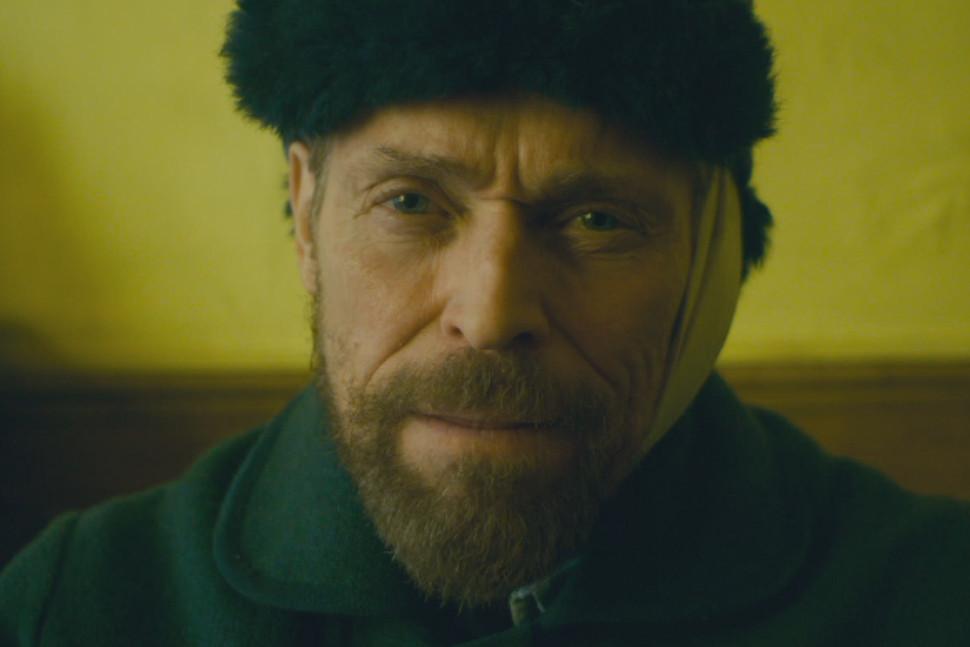




Dir: Julian Schnabel | Cast: Willem Defoe, Oscar Isaac | US Drama | 111’
Julian Schnabel’s training as an artist informs another of his portraits of creativity like Basquiat, Reinaldo Arenas and Jean Dominique Bauby. With At Eternity’s Gate he turns his camera on the tragedy of Vincent van Gogh with this luminous vision of the artist’s final days in Provence.
There have been many broad brush insights into the painter’s troubled life recorders on the big screen; the most recent, Loving Vincent (2017) attempted a living painted drama of the Dutchman, while Van Gogh: A New Way of Seeing (2015) explored the prodigious correspondence with his brother Theo. The reason to see this one is Willem Dafoe’s fabulous fleshing out of the artist in his febrile, sun-drenched final days after the breakdown of his fraught friendship with Gauguin (an unremarkable Oscar Isaac).
Schnabel captures the glowering intensity of Van Gogh’s desperate descent in paranoia but also portrays the artist as a gentle introvert who was as much misunderstood as maligned by the petit parochialism of his Provençal neighbours.
Benoit Delhomme’s hand-held camera hovers around feverishly and vivid yellow predominates. Intense and intimate close-ups pan out into flaming widescreen vistas vibrating in the summer heat. The worst element is Tatiana Lisovskaya’s screeching score that will make you run for the exit. It over-eggs the already over-baked picture of dismay and despair..
Jean Claude Carriere writes with Schnabel and Louise Kugelberg (the latter also his co-editor) to sketch out the broad strokes of the narrative which opens in Paris in the late 1880s where van Gogh is an already an outsider amongst the Artistes Independents du jour. His financier and brother Theo (a well-cast Rupert Friend) cannot sell his avant-garde works, Vincent opining: “God made me a painter for people who are not born yet”. Only Gauguin appreciates his talent but the two are incompatible as housemates.
“Go south, Vincent,” Gauguin tells him when van Gogh complains of rainy skies and fog, whereupon he moves to Arles where he discovers his yen for landscapes which glow and shimmer in the heat as Delhomme’s visuals capture the textures of roots, earth, leaves as well as the soft windswept pastures. We feel for Vincent when a schoolteacher (Anne Consigny) openly mocks his work in front of her kids, and after a violent outburst he is sent away from the town, admitting his fear of going mad – but it could be that he just hates people and prefers solitude, which is understandable amongst these cackling idiots.
With Gauguin he enjoys a companionable time until success takes him to Paris whereupon van Gogh starts to unravel emotionally with the famous ear incident. A doctor (Vladimir Consigny) suggests some therapy, that merely confines the artist to a straitjacket. Ironically this comes at the same time as an influential Paris art critic praises his work as uniquely sensual. Meanwhile a priest (Mads Mikkelsen in thoughtful mode) damns his vision and calls his work ugly.
This sensuous re-imagining of the artist’s final days belongs to Dafoe whose craggy features and piercing blue eyes convey a lost and melancholy soul whose sensitivity and artistic genius have now made him a household name . MT
NOW ON NETFLIX. TRAILER courtesy of Curzon Cinemas | VENICE FILM FESTIVAL 2018 Winner Best Actor: Willem Dafoe